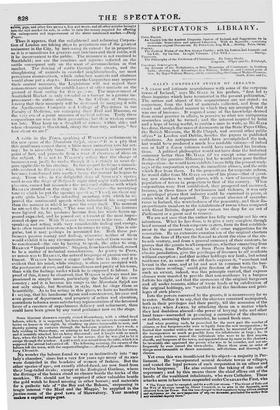• then the manner in which he gave the song
itself. The moment he tailored the first words, " The rose and the lily," his features were lighted up, hi: gestures became free, his whole figure ap- peared expanded, and he poured out a torrent of' the most impas- sioned ckque ice. With W ssox the reverse is the case. After speaking and acting with very considerable feeling and energy, he is often turned into stone when he conies to sing. This is sin- gular, but it may perhaps be accounted fur. Both these per- formers possess energy and feeling, otherwise neither of them would exhibit it in any circumstances; but each of them seems to be constrained—the one by having to speak, the other to sing. BRAM AM "lisped in numbers." Singing, from his childhood, ceased to be a matter of technical consideration. As poetry to POPE, SO music was to BRAH AM, the natural language of' passion and sen- timent. WILSON became a singer rather late itt life; and it is evident that his mind, while singing, is often more occupied with the portaneento di yore, and the smoothness and purity of his tones, than with the feelings under which lw is supposed to labour. In proof of this, it may be observed, that WILSON is always most im- passioned in simple music, particularly the ballads of his own country ; and it is because his songs in the Mountain Sylph are not only simple, but Scottish in style, that he sings them so beautifully. As to his acting in this piece, we have no hesitation it saying, that his handsome figure and countenance, his ease and even grace of deportment, and propriety of action and elocution, contribute to form a more satisfactory representation of the favoured lover of a creature of superhuman delicacy and refinement, than could have been given by any vocal performer now on the stage.


















 Previous page
Previous page